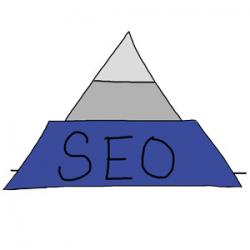SEO Does Not Equal Traffic

Since consumers have been using search engines to find what they need online, marketers have tried to find ways to improve their clients’ position in those search engines. These search engine optimizers come with a wide variety of tactics.
The first thing to understand about search engine optimization (SEO) is that it’s not a silver bullet. You can never look at SEO with the idea that if you are at the top of the search engines, your phone will start to ring.
I am amazed how often people will think that if you increase rankings in the search engines, you will magically start getting new business. This attitude would be like saying, “I put a sign outside my store, so why am I not selling more stuff?”
In my book, I equate SEO to brand awareness. I look at SEO as a way to let the search engines know who you are and, therefore, put you in a more likely position to generate new traffic.
Some products and services naturally tend to provide a greater opportunity for traffic. For example, if I am looking to buy a new bicycle and I do a Google search for bicycles, then a website optimized for bicycles will be more likely to garner traffic because of it.
Common to All Businesses
In the last few years since I started Tribute Media I have worked with hundreds of clients. The most common problem that these clients have, regardless of the market they serve or the products they sell, is that what their clients think they do is significantly less than what they actually do.
So often, I hear statements like, “If they would only know that we did ‘x’.” I might even hear, “Our clients call it ‘y’ but we do ‘z’.”
This means that the most common thing I find among my clients is that we have to gain awareness for products and services that the client may not even know that he or she needs. We might find that the search term that searchers use is very different than what you, in your company, actually call it.
Different Expectations Require Different Tactics
When we find that what we do is different than what our customers are looking for, it means that we need to take a different approach to the way we optimize for the search engines. This can be a very difficult thing for most business leaders to understand. They have been in their industry for so long, they forget, quickly, that people who don’t know what they do don’t understand their lingo.
Let me give you an example.
A number of years ago, I was providing graphic design and printing services to a video distributor. One service I provided was to create large quantities of PVT labels. We had a wide variety of these PVT labels. In fact, we made more money on PVTs than most other products that we offered.
I was driving down the street one day and found that a video store had a sign in front of their location that said, “PVTs - $6.99.”
I laughed out loud (without the text acronym).
I laughed because, like you right now, I realized that most people have no idea what a PVT is. Of course, I knew, PVTs are previously viewed tapes. But, the clients of these video stores had no idea.
The marketers of that video store were marketing with their own jargon and not what people were actually looking for.
SEO and Traffic
I mentioned at the beginning that many people think that if you are high in the search engines that you’ll naturally make more sales. The reality is that just because you are high in the search engines, you may not garner more traffic.
SEO’s purpose is to get rankings and not traffic. However, that doesn’t mean that if you optimize for the right terms you won’t also gain more traffic.
The reason this is so is that people search on different things. They search for the things they understand. Now, if you sell Honda’s and someone wants to buy a Honda, then you’ll probably want to optimize for Honda. Most business don’t have that luxury. Most businesses need to optimize for terms that solve the clients’ problems and then guide them to the specific product or service they offer.
What’s this Mean?
Too often, we treat our marketing online like this. We think that, because we know the term, people searching for us will naturally know what we call it.
Here’s a hint… usually they don’t. Usually they search for terms that solve their needs until they learn the industry terms. In fact, usually, they’ll search for a wide variety of terms near to what you do and then try to figure out how it applies to them.
So, when you think about the work that you put into search engine optimization, you’ll want to optimize for terms that are exactly what you do. What’s more important is that you try to identify what terms your clients are more likely to search for and optimize for those terms as well.
While you won’t increase your traffic with search engine optimization directly, it is the first step to be able to grow your business. The more credibility you gain with the obvious terms the more likely it will be that you’ll be able to increase rankings in the terms that people are actually searching on.

Corey Smith and his wife are the proud parents of five wonderful children and live in Meridian, Idaho. He is the president of Tribute Media, a Meridian based Web Consulting firm.
He is the author of two books, "Do It Right: A CEO's Guide to Web Strategy" and "Tweet It Right: A CEO's Guide to Twitter." You can learn more about his books here.
Interested in having Corey speak for your organization? Need help building or marketing your organization? Want to tell Corey how cool you think he is?
